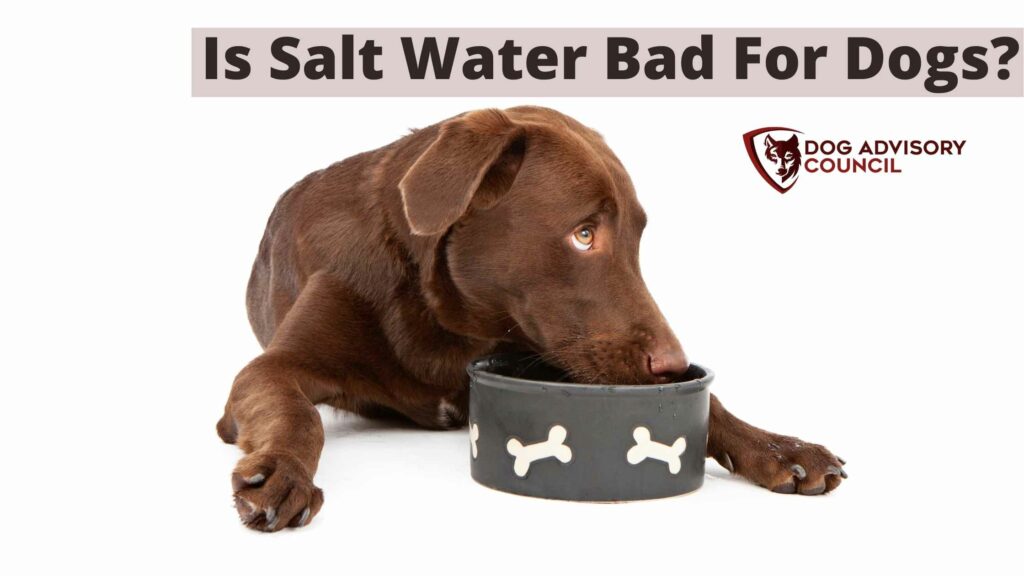
You know that salt water tastes horrible, but dogs often try to drink it anyway. So, what’s the deal? Is salt water bad for dogs, or is it good? Here’s what you should know.
Drinking salt water can cause diarrhea in dogs if they drink a significant amount. If your dog drinks a lot of it, the high salt content can cause vomiting, severe diarrhea, and severe dehydration. It can lead to a fatal sodium overdose, too. It’s rare for dogs to drink enough salt water for this to happen, but it is possible.
Does salt water hurt dogs?
Saltwater can and does hurt dogs, and many pet parents don’t even know how at-risk their dogs are! The salt content in salt water is, of course, exceptionally high. Dogs are susceptible to sodium poisoning with a very small amount compared to humans.
Saltwater can also hurt your dog’s skin, fur, paws, and eyes, though the “damage” wouldn’t be nearly as severe as drinking the salt water. We’ll explain it all below!
Do dogs know not to drink salt water?
Unfortunately, dogs don’t understand the importance of not drinking salt water. Even if they dislike the taste of it — and understandably so — they’ll drink it anyway because they are thirsty. Dogs don’t understand that it will just dehydrate them further.
How much salt water is bad for dogs?
A few mouthfuls of salt water aren’t enough to damage your dog’s body. If they drink more of it, though, it can set off sodium toxicity. The thirstier that dogs are, the more they’ll drink. Many pet parents don’t even realize how much their dog has had to drink since dogs can be discreetly drinking as they play in the water.
What do I do if my dog drinks salt water?
If you notice that your dog’s had some salt water, you’ll want to do these steps immediately:
- Call him away from the water and use a command like “no” or “stop”
- Offer him fresh, cold water
- Allow him to go back into the water again but watch him carefully
- Repeat as necessary
Remember that dogs will drink that salt water when they’re thirsty. So any time you see them drinking salt water, it’s a cue to offer them fresh water. Plus, the fresh water they drink will help counteract the salt water they drink in a positive cycle.
Symptoms of saltwater poisoning in dogs
No matter how careful you are, you’ll want to watch your dog for saltwater poisoning symptoms any time they spend a good deal of time near and in bodies of salt water. The symptoms that you can expect include:
- Vomiting
- Diarrhea
- Excessive thirst
- High heart rate
- Lack of appetite
- Lethargy
- Confusion
- Change of behavior immediately after swimming
The more of these you notice, the more that you need to get your dog to a vet as soon as possible. This is especially so if your dog has the last symptom on the list.
Often, the signs of sodium poisoning are so mild to us that we don’t notice them in time to get your dog help. You’ll need to really watch for these and be ready to bring your dog to the vet if needed.
How long does salt poisoning last in dogs?
Salt poisoning can last for hours or days, depending on its severity and how your dog reacts to it. Recovering from salt poisoning is about restoring your dog’s electrolyte balance, which can be challenging when you are unsure what to expect.
For this reason, the most essential thing you can do if you suspect even mild sodium poisoning is to get your dog to a vet so they can run tests and see just what you’re dealing with. They can also offer fluids to restore their balance faster and easier than you can at home.
How long does beach diarrhea last in dogs?
Beach diarrhea is a very liquid type of diarrhea that many see after a beach day with their dog. This is often caused by severe dehydration that is often worsened by drinking at least a bit of salt water. This can last hours or days, and you’ll want to watch carefully to see if other symptoms of salt poisoning appear.
What to do if your dog has beach diarrhea
You can treat beach diarrhea at home by giving your dog a bland diet and plenty of fresh water, but you will want to take them to the vet if it lasts longer than several days and/or they have other symptoms of salt toxicity. Encourage your dog to eat and drink as much as they want since this will help them recover as best they can.

How to treat saltwater poisoning in dogs at home
Above, we talked about balancing electrolytes and helping your dog recover from salt poisoning is hard to do at home, and a vet visit is recommended. This is very much the case, and seeing a vet if you suspect your dog is suffering from salt toxicity is essential.
However, if they send you home and tell you that you can treat them at home, or getting to a vet isn’t possible for whatever reason, then there are a few things that you can do:
- Encourage your dog to drink a lot of fresh water
- Give your dog water-rich foods (wet dog food or mashed pumpkin, for example)
- Give them a normal amount of food
- Encourage them to relax and rest to prevent overheating and further dehydration
- Watch for signs of complications
Even if your vet sends you home with assurances that your dog is fine, make sure that you still watch for those severe symptoms that we listed above of sodium toxicity. If any of them develop, bring your dog in again. These symptoms can lead to permanent brain damage and death, so you must get your dog to an emergency vet as soon as possible.
Is it okay for my dog to swim in the ocean?
If you’re feeling a little nervous about your dog being anywhere near the ocean, it’s totally okay. You can safely let your dog swim in the ocean for sure, but make sure that you keep an eye on their drinking the sea water so that you can stop it immediately. Remember, too, that ticks and other creatures can flock to the beach, and you’ll want to check them over for pests after.
Do you need to wash the salt water off dogs?
If your dog has been swimming in salt water, you’ll want to rinse them off thoroughly as soon as possible. It helps clear excess salt water from the fur, so their skin, paw pads, and fur won’t be dried out. It also prevents them from licking salt off their fur when they groom themselves, which can complicate their sodium ingestion further!
Does salt water make dogs itchy?
It’s possible that your dog might be itchy after salt water gets in their fur and skin since it dries out both their skin and fur. This can make them pick at the skin more, particularly their paws and other sensitive areas. Sand often makes them itchy, too. This is all the more reason to rinse them off thoroughly with fresh, cool water!
Does salt water make dogs pee?
Yes, drinking salt water will make dogs pee a lot since the salt will dehydrate them and push the water from their bodies. This is another reason that you’re going to want to rehydrate them regularly throughout the outing and also afterward, too.
Is salt water bad for dog paws?
Saltwater is bad for dog paws. A dog’s paws are very sensitive and can dry out quickly. This can make walking uncomfortable, which means that their skin is weakened until your dog is properly hydrated.
Is salt water bad for a dog’s eyes?
Dogs often close their eyes when swimming and playing in the salt water, but it can be bad for a dog’s eyes if there is too much exposure. Their eyes will dry out, and you’ll notice them picking at their eyes a bit more.
Can dogs drink salt water from a pool?
If you have a saltwater pool, you’ll want to take a similar approach to beach water. While its content is slightly lower, it wouldn’t be by much. Don’t let your dog drink the salt water from the pool, and follow the same advice above for what to do and what symptoms to look for!
How to stop my dog from drinking seawater
If you’re worried now about your dog drinking salt water (and understandably so). In that case, you’ll want to follow these very doable and possible steps to keep your dog from drinking very much.
- Bring your dog out of the salt water every 15 minutes
- Keep your dog in the shade to rest for a while
- Give them fresh water every time you bring them out of the water
- Stop them from licking their fur, paws, etc
Remember that a few laps here and there will be fine for your dog. Just don’t let your dog liberally gulp down mouthfuls of it! Step in with a command and remember that the cure to their drinking salt water is by ensuring they aren’t thirsty in the first place! Proper preparation with water bottles and bowls is a must when spending time in the water.
In conclusion
Saltwater is bad and dangerous for dogs to drink. It can lead to severe dehydration and even death very quickly in dogs. This is from sodium poisoning, and it happens very easily and quickly in dogs.
Make sure you know the symptoms to watch for and be ready to take them to a vet for emergency care.
